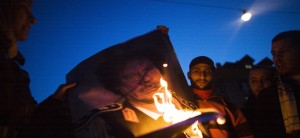 Libyans celebrated the liberation of the east of the country from the rule of Muammar Gaddafi, who has vowed to crush the revolt and on Wednesday was trying to assert his grip on the capital Tripoli, in the west. The opposition vowed to “liberate” Tripoli, where the four-decade Libyan leader is holed up with a force of militiamen roaming the streets and tanks guarding the outskirts.
Libyans celebrated the liberation of the east of the country from the rule of Muammar Gaddafi, who has vowed to crush the revolt and on Wednesday was trying to assert his grip on the capital Tripoli, in the west. The opposition vowed to “liberate” Tripoli, where the four-decade Libyan leader is holed up with a force of militiamen roaming the streets and tanks guarding the outskirts.
Lying between Egypt and Tunisia, where a wave of Arab unrest has unseated two veteran presidents, the desert nation of six million which Gaddafi has ruled for 41 years seemed split in two, trapping thousands of foreign workers, jeopardizing oil exports and raising fears of tribal conflict and civil war.
An army of African mercenaries also were streaming toward Tripoli to reinforce Gadhafi’s stronghold, The New York Times reported.
In a further sign of Gadhafi’s faltering hold, two air force pilots — one from the leader’s own tribe — parachuted out of their warplane and let it crash into the eastern Libyan desert rather than follow orders to bomb an opposition-held city.
President Barack Obama called for international unity to end the violence. He did not say Gaddafi should go, but said he would be held accountable for any abuses.
“It is imperative that the nations and peoples of the world speak with one voice,” Obama told reporters at the White House in his first public comments on the 10-day-old revolt. “The suffering and bloodshed is outrageous,” he said.
French President Nicolas Sarkozy raised the possibility of the European Union cutting off economic ties.
Another proposal gaining traction was for the United Nations to declare a no-fly zone over Libya to prevent it using warplanes to hit protesters. U.N. High Commissioner for Human Rights Navi Pillay said that if reports of such strikes are confirmed, “there’s an immediate need for that level of protection.”
Italy’s Foreign Minister Franco Frattini said estimates of some 1,000 people killed in the violence in Libya were “credible,” although he stressed information about casualties was incomplete. The New York-based Human Rights Watch has put the death toll at nearly 300, according to a partial count.
In the eastern city of Benghazi, cradle of the uprising and home to tribes long hostile to the 68-year-old leader, thousands filled the streets, lighting fireworks and waving the red, black and green flag of the king Colonel Gaddafi overthrew in 1969.
“We have been suffering for 41 years,” said 45-year-old Hamida Muftah. “Gaddafi has killed people … We are a very rich country, but most of the people are poorer than poor.”
Some 200 km (120 miles) further west, in Tripoli, which remained largely closed to foreign media, local journalists said streets were calm after sporadic violence in recent days.
Gaddafi’s state television channel showed dozens of loyalists waving his portrait and chanting his praises.
“Lots of people are afraid to leave their homes in Tripoli and pro-Gaddafi gunmen are roaming around threatening any people who gather in groups,” said Tunisian Marwan Mohammed, who was crossing the border home after leaving the Libyan capital.
Gaddafi’s children spoke up in defense of the man who went on television on Tuesday to fulminate against “terrorists” and promise to “cleanse Libya house by house.” They also sought to tell viewers foreign media were misreporting the week’s events.
“Libyans are the victims of the biggest joke,” his son Saif al-Islam, once seen as a reformer, told state television. “So wake up. Everything was lies. The truths start today. You will see it with your own eyes, tomorrow and after tomorrow.”
Another son, former professional footballer Saadi, told the Financial Times that Saif al-Islam was drafting a constitution to “bring in new blood to govern our country,” adding: “My father would stay as the big father who advises.”
MSNBC, Reuters

Leave a Reply
You must be logged in to post a comment.